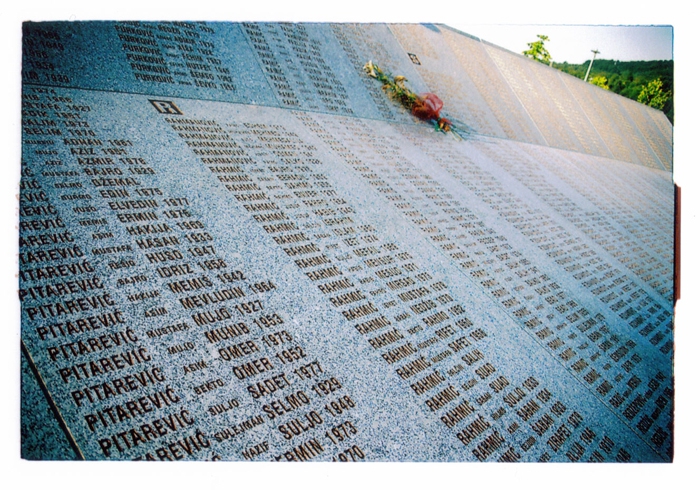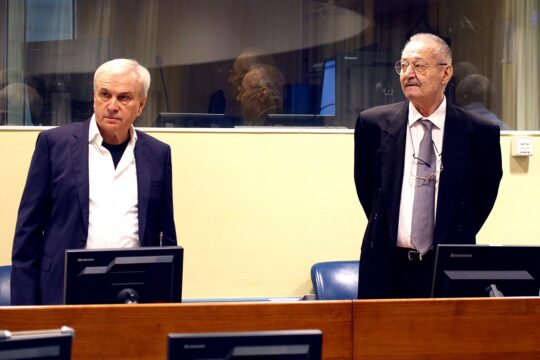As Bosnia prepared to mark 20 years on Saturday since Srebenica massacres, the UK this week proposed a Resolution seeking to have the UN Security Council declare the events in Srebenica as genocide. Despite negotiations and a postponement of the vote, Russia on Wednesday vetoed the proposed Resolution and Serbia hailed this as a victory.
Sandra Orlovic is Executive Director of the Humanitarian Law Center in the Serbian capital Belgrade. She spoke to JusticeInfo.net about the proposed Resolution and Srebenica.
JusticeInfo.net: How do you react to the Russian veto of the British Resolution on Srebenica, and the fact that Serbia is hailing this as a victory?
Sandra Orlovic: Well we at HRC and many human rights activists and intellectuals are disappointed and embarrassed by this position of the Serbian government. In the last month during these negotiations between Great Britain and other members of the Security Council, it was obvious what the Serbian government position was on this Resolution, that it would damage the image of Serbia, that Serbians and Serbs would be stigmatized as a genocidal nation, etc. There was a lot of manipulation by the Serbian government and officials regarding the content of the Resolution, because they were interpreting it in a manner which is not actually in line with what is in the text of the Resolution. When you actually read the text, you see there is no mention of Serbs as a genocidal nation, or that the only guilt for all crimes committed in Bosnia is on the Serbian side. No, the Resolution has very mild statements which basically recognize all victims from all sides in the Bosnian war (…) And also, probably the most problematic part for the Serbian side was the statement which invites political leaders to refrain from denying genocide and other judicially proven crimes in Bosnia.
JusticeInfo.net: Why do you think the issue of categorizing Srebenica as genocide is still so divisive between Serbs and Bosniaks, in particular?
SO: I think the question should be why is the legal qualification and notion of genocide is so hard to accept on the Serbian side. I think the qualification of genocide, as well as joint criminal enterprise which is another very contentious term are hardly accepted by the Serbian public. It is because behind this term there is a notion of the systematic nature of crime. If you follow the statements of Serbian politicians about crimes in former Yugoslavia, you will see always they are admitting that some crimes did happen, but they were committed by some individuals who were not representing the Serbian State or Serbian nation, that there were some lunatics and individuals unrelated to the institutions. But when you start insisting on a genocide or joint criminal enterprise as legal qualifications, which were confirmed in several judgments, then you start speaking about the systematic nature of crime, which means that these crimes in Bosnia, but also in Croatia and Kosovo, were committed on a systematic, massive scale. (…) And that I think is the most contentious point between the Serbian and Bosnian side.
JusticeInfo.net: Do you think it was a mistake by Britain to introduce this Resolution just before the twentieth anniversary of Srebenica? Some people are saying it has just made the divisions wider…
SO: I think that is only one local interpretation of this initiative, which is in line with the common understanding of the meaning of our wars and the consequences of our wars here in the Balkans. Because people here think the war that happened in the former Yugoslavia has consequences and implications only for our region, which is not true. The genocide in Srebenica has global implications, especially because of the role of the United Nations, I would say the embarrassing role of the United Nations and some other countries which could have prevented the genocide but they didn’t. (…) And on Wednesday during the discussion in the Security Council we could clearly hear the echo of what I am saying now, that United Nations representatives were pretty much critical towards the UN role during and after the events in Srebenica. And they repeated and referred to the Resolution adopted by the Security Council on the occasion of the twentieth anniversary of the genocide in Rwanda. And you can clearly see that these type of events, this type of anniversary deserve to have the attention of the highest political body in the world. These events are not only our own local history but the history of mankind and I don’t see any problem introducing this Resolution, especially with this kind of content of the resolution by Great Britain.
JusticeInfo.net: As you said earlier, the events that happened in Srebenica have been recognized by courts as genocide. Can you tell us about that?
SO: Well, the International Criminal Tribunal for former Yugoslavia, which was set up by the United Nations, has established in four final judgments up to now that genocide was committed in Srebenica in mid-July 1995. These are all cases in which the court examined tens of thousands of pieces of evidence presented by prosecutors and defence. The court clearly established that there was a plan to destroy the Bosniak community in Srebenica and United Nations-protected safe areas. There were written documents presented by prosecutors, documents issued by the institutions of Republika Srpska (Serb entity in Bosnia Herzegovina) which clearly state intent to destroy Bosniak people. After military and police of Republika Srpska entered Srebenica, they divided men from their families. The executions of men and transportation of children and women from that area to territory under the control of the Bosnian army, all these actions of police and military of Republika Srpska were practical implementation of this clearly stated intention to destroy the Bosniak population on this territory. (…)
JusticeInfo.net: I believe there was also a decision at the International Court of Justice?
SO: Yes, in 2007 the International Court of Justice, another court established by the United Nations, examined a lawsuit filed by Bosnia and Herzegovina against Serbia which basically asked the court to establish responsibility of Serbia for breaching the UN Convention on preventing and punishing crimes of genocide. The ICJ established that Serbia did not directly commit genocide. However it established that, bearing in mind the relations between the Serbian State and Republika Srpska institutions at that time and the financial, material and all other kinds of support that Serbia was providing to Republika Srpska, the Serbian State did violate the Convention, because Serbia was in a position to prevent the genocide at that time but it did not. Also, the ICJ established that Serbia did not punish and prosecute perpetrators of genocide, in the first place Ratko Mladic (former Bosnian Serb army commander) who was at that time fleeing from international justice and hiding in Serbia. Serbia is the first state in the world’s history to be declared responsible for violating the Convention against genocide and this fact, we believe, obliges Serbia’s political elite to have a responsible and continuous dialogue about what happened in Srebenica. The attitude of Serbia regarding the Resolution that was vetoed by Russia and the sense of victory we see in the statements of our political representatives is not something we can be proud of. Serbia needs to have a very responsible attitude towards victims and qualification of genocide, because it is the only state that has ever been declared responsible for violating the UN Convention against genocide.






